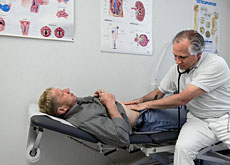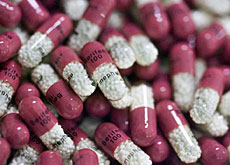Calls for action over treatment rationing

Swiss doctors are in some cases rationing the treatment they provide - but the practice is kept quiet.
The Swiss Academy of Medical Sciences is calling for more public debate on the issue and says guidelines should be drawn up for medics.
Spiralling health costs, an ageing population and continual advances in medicine mean that some countries have already started to consider whether to ration certain therapies.
But weighing up the usefulness of treatments against their cost opens up an ethical and legal minefield.
Britain has already set some limits, such as on hip operations and renal replacement therapy for patients over the age of 70. In some parts of the country, smokers have to give up their habit first before they will be considered for a heart operation.
In many other countries – Switzerland included – the subject remains taboo.
“You cannot expect the public to express a willingness to give up its rights in this area,” Anne-Marie Boillier of the Swiss Patients Association told swissinfo.
This view is largely shared by the medical profession. “No one in our country would accept the drastic measures that have been slated in English-speaking countries,” said Peter Suter, president of the Swiss Academy of Medical Sciences.
“Nonetheless, the fact remains that in Switzerland too spiralling health costs are leading to treatments being rationed.”
Secret practice
Although it is estimated to be fairly widespread, the practice remains one mainly carried out in secret. One example, says Suter, is staff cuts in hospitals, particulary in geriatric and psychiatric wards which need expensive treatments and a lot of attention.
Treatments are not spared either. In a recent study published by the Swiss Academy of Medical Sciences, two-thirds of doctors admitted that for cost reasons they had not carried out medical tests or analyses that would have benefited patients. These included laboratory tests and computer assisted tomography.
Experts say that on the basis of statistics, Switzerland has a higher percentage of secret treatment rationing than countries including Italy, Britain and Norway.
This shows that Swiss doctors still enjoy a relative amount of freedom in medical decision-making compared with their foreign colleagues, they add.
But some in the Swiss medical profession would be ready to accept limits. “Deciding priorities and denying treatments is not a simple question, morally and ethically,” said Suter.
“Medical staff have to take on this burden alone and would like to share it with the authorities.”
Suter points out that it can be difficult to convince a patient that they should not have a potentially useful treatment. “There’s a risk that they won’t understand the reason and would feel they are the victim of an injustice, and that there’s a disparity in terms of treatment compared with other people suffering illnesses.”
Public debate
This is why the academy wants to bring the topic out into the open and launch a public debate.
It is calling on the federal and cantonal health authorities to adopt in the next two years a series of directives which doctors could use to help determine whether treatment rationing should be carried out and if so, to what extent.
Health experts are not calling for fixed rules or lists of therapies that could be limited or denied. “The final decision would be discussed by the doctor and the patient,” said Bouillier of the patients’ organisation.
The important factor is that by using the guidelines the doctor feels reassured when taking his or her decision.
“And the patient will not feel discriminated against and as a consequence will accept it more easily if a treatment is withheld,” said Suter.
swissinfo, based on an Italian article by Anna Passera
In 2004 Switzerland spent SFr51.7 billion ($43.5 billion) on its health system, according to the Federal Health Office
This represents SFr6,929 per inhabitant or 11.6% of GDP.
Over the years health costs have continued to rise – in 1995 they made up 9.5% of GDP and in 1960 just 4.9%.
In Britain the criteria for rationing of treatments vary from region to region. Sometimes they are age-based, at other times they depend on a patient’s behaviour during his or her illness (for example, smoking).
In the US state of Oregon treatments have been prioritised. Vaccinations, hospitalisations and major operations are at the top of the list. At the bottom are treatments that would result in minimal or no improvement as well as for terminal-phase Aids.
In New Zealand clinical guidelines for treatment rationing has been approved in five areas.

In compliance with the JTI standards
More: SWI swissinfo.ch certified by the Journalism Trust Initiative


You can find an overview of ongoing debates with our journalists here. Please join us!
If you want to start a conversation about a topic raised in this article or want to report factual errors, email us at english@swissinfo.ch.